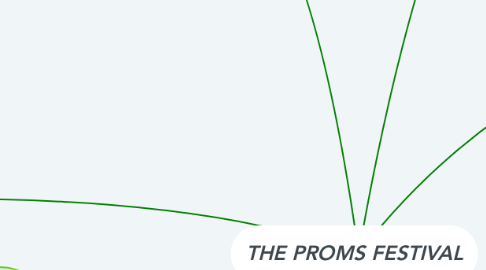THE PROMS FESTIVAL
by Milena Klimets

1. How did the Proms start? What 3 things were at the core of the idea?
1.1. The first Proms concert took place in August 1895 and was the brainchild of the impresario Robert Newman, manager of the newly-built Queen’s Hall in London. His vision was to reach a wide audience by including more popular programming, less formality, and keeping ticket prices low. This was pretty revolutionary as he removed seats in the stalls – traditionally the priciest as they are closest to the orchestra – and let people stand in the ‘promenade’ he created to enjoy the concert for a low price He wanted to end formal and regimented ways of presenting serious classical music and create a music festival for the people. Smoking and drinking were encouraged by audiences in those early days to make sure everyone felt welcome and relaxed. However, it is the conductor Henry Joseph Wood whose name is most closely associated with the concerts. As conductor from that first concert, Wood was largely responsible for expanding the repertoire heard in later concerts.
2. What impact did the two world wars have on the Proms?
2.1. Even two World Wars could not stop the Prom concerts continuing although the annual festival of world-class performances by the world’s greatest classical musicians of the past, present, and future were a little curtailed from 1915-18 and 1940-45 as the two World Wars raged. Even when the original venue of the Queen’s Hall was bombed by the Nazis and destroyed in 1941, the Proms were moved to Royal Albert Hall in Kensington, London and have remained there ever since. In 1927, the British Broadcasting Corporation (BBC) began broadcasting the Proms concerts on the radio and later TV too, meaning that the music became even more accessible to everyone.
3. What does the ‘Last Night of the Proms’ traditionally end with? What was different in 2020? How did people react to it? What did the BBC decide to do in response to it?
3.1. The most popular ‘Last Night of the Proms’ traditionally ends with the singing of the patriotic songs ‘Land of Hope and Glory’ and ‘Rule Britannia’, with the audience and those watching at home enthusiastically joining in. The BBC originally decided to play instrumental versions only not just because of concerns about singers gathering with the threat of COVID-19 but also because the lyrics might potentially be associated with colonialism and slavery. This led to outraged outpourings from thousands including public figures from actors to politicians, most of which declared that the pomp and pageantry of the Proms was a staple of the British summer.
4. What is "Land of Hope and Glory"?
4.1. It is a national song, that is sang on the last day of the Proms, alongide with the song "Britannia"
5. Where is it held?
5.1. They are held every single night of the week at the Royal Albert Hall in South Kensington,London.
6. What are the Proms?
6.1. is a series of concerts that are held from the middle of July until the middle of September.
7. How is it possible to visit the Proms?
7.1. ‘Promming’ is still the cheapest way to go to the festival, and people don’t need to book in advance. Last year up to 1,350 standing places were available every day for the equivalent of about $8.Besides,there is an intresting fact about people's obcession in England to queue.The Proms queue is a kind of the gold plated designer version of queueing.When you shop up to be in the proming line you can turn up any time.You'll be given a raffle ticket.This ticket has a number on it and it shows your position in the queue.It means that if you need to go away and get a drink or use the bathroom-that's totally fine because no one's gonna still your place in the queue.
8. What kind of music could you listen to at the Proms?
8.1. The main thing that makes the Proms so special is the dazzling range of music on to offer. You can hear everything from the Giants of classical music: Mozart, Beethoven, and Brahms Furthermore, you are lucky to listen to orchestras and choirs music, some stars from jazz world and experimental music


